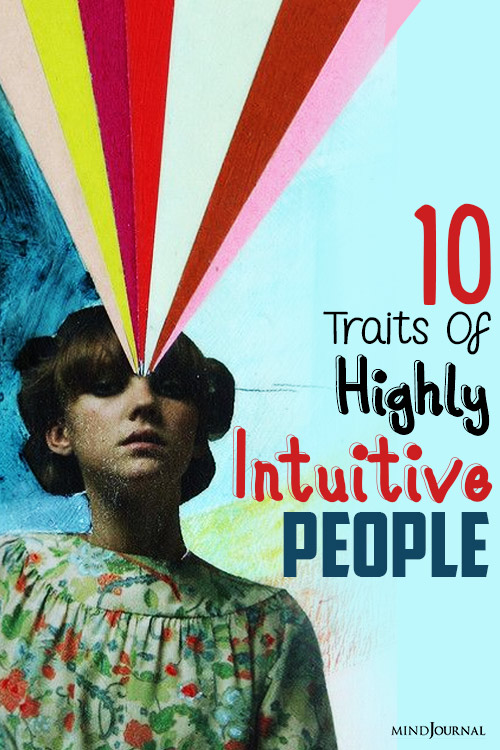An intuitive person is really a gifted soul who sees the world differently and feels every emotion very deeply. Their perception of life is what separates them from the crowd. The traits of an intuitive mind are somewhat subtle and covert, yet these very signs of highly intuitive people make them misunderstood by others.
These are the people who take interest in theories, abstractions, and exploration of things, almost non-existent in the real world. They tend to incline towards finding deeper meaning and understanding of any given expression or thought and have more inclination towards what isn’t said or even considered than what is actually being expressed.
10 Traits Of Highly Intuitive People
These 10 traits of an intuitive mind, at times, make them feel misunderstood by others, even by people who are close to them.

1. Sparking Debates
One of the traits of an intuitive is they frequently get into debates. Intuitives need to examine an issue from all perspectives which allows them to comprehend the actual meaning of any situation or a topic. The reason they jump into debates is only because of their own personal need to improve their understanding of the topic. By no means, they act impolite or challenge others with their knowledge. They just want to inspect the legitimacy of the topic and check it from every angle to discover any shortcomings. Debating helps them to understand things in depth.
2. They Live For The Future
More than the present, they love to live for the future. They are always thinking about the options and opportunities that might appear to them in 20 years. They plan ahead their goals and predict a possible life for themselves for another twenty to thirty years from the present.
Since it is not at all possible to chalk out a plan down to every detail, it is obvious that the plan will get readjusted several times. This is one of the most visible traits of an intuitive person and can be seen through the different personality types of intuitive individuals. Extroverted Intuitives (xNFPs and xNTPs) make readjustments every day, and introverted intuitives (xNFPs and xNTPs) do this as and when needed, although the need arises quite frequently.
Related: 14 Signs You’re An Emotionally Intelligent Person
3. Can Flout Rules
An intuitive always has a clear conception of every self-imposed rule and strongly abides by them. But if they raise questions, they don’t mean to be rebellious; it’s just that they want to know why those rules have been framed and if the reasons are sound enough. They cannot accept illogical action, so if a rule appears to be useless or obsolete, they won’t hesitate to ditch it and do things as per their wish.
4. Over-Analyzing Every Matter
To an intuitive, it is not enough to merely analyze an issue but to understand the extent of its effects on the surroundings. They must understand the underlying theory that has led to its development. Intuitives won’t stop until they have understood the intangible explanation for any tangible problem that appears before them. This can really drive others around them, insane.
5. Cannot Accept Authority
Intuitives don’t always rely on qualification, rather they believe in a person’s competence. Their judgments are always based on how competent others are. Intuitives know very well how inclined the human mind is towards prestige and convenience than on analysis. But that cannot deter them from questioning the established system which is accepted for decades, sometimes centuries.
Related: How Dark Is Your Soul? QUIZ
6. Persistently Look For Variety/ Variations
An intuitive is naturally attracted to the unconventional, abnormal, and uncouth. Throughout their lives, they keep on attempting to form an elaborate worldview, which explains why they make such great efforts to understand as many strange and peculiar things as possible. They are always looking for new perspectives, whether it is their studies, their lifestyle, or anything else, and this is why the new lenses can give them a completely different view than what they still know
7. Obscure Interests
What is already known is of no interest to the intuitive personality and that is why they would always explore the areas which most people cannot think to exist. The intuitive’s area of interest or study would always be on niche theories or topics that no one else has ever thought of venturing.
Conspiracy theories may arouse curiosity in many of the intuitive and they would take a keen interest in exploring them. They would always try to find out the methods of reasoning that are still unknown, and that shouldn’t surprise anyone given their innate ability to enjoy ‘mental gymnastics’ that is involved in linking apparently two unrelated subjects. Ironically, they don’t believe in the actual theories themselves in the end.
8. Socialize With Their Type
Extroverted intuitives (mainly ENFPs and ENTPs) are known to be the most introverted of the extroverted types. Introverted intuitives (mainly INFJs and INTJs) are habitually more introverted, but if they get each other’s company they can easily talk for hours, if not endlessly.
Intuitive-dominants get drained keeping up with their physical environment, but the quality conversation never tires them, rather it energizes them greatly. They call themselves ‘selectively social’ as they can’t connect with people who are not on the same mental plane. That is why they prefer to be alone unless they get the opportunity to mix with other intuitive types.
9. They Pose As Devil’s Advocate
They can’t stand it when someone insists that a matter in question is black or white. They wouldn’t mind playing devil’s advocate if they sense that the opposition is trying to thrust an opinion without considering the alternative views. These personalities are inclined to argue fervently on those points which they themselves don’t believe. They would do it just to prove that an issue is more complicated than what others believe it to be.
Related: 6 Traits Of An Emotionally Mature Person
10. Their Lifestyle Is Strange
Intuitives are born with a penchant for everything that is strange, unconventional, and provocative. They are different because their love for uncommon things doesn’t translate into entrepreneurial ventures but to relationship structures that are non-traditional or make lifestyle choices that are not as per social norms.
Rebel Without A Cause
Intuitives are not repulsive to the thoughts and ideas which are easily dismissed by others. They would include such things in their lives and come to be viewed as rebellious by society even though they have no intention to be labeled as such. They don’t aim to do things in stark contrast to what is prevalent in society, but an intuitive’s way of life reflects just that. Their mindset is reflected through their lifestyle, and undoubtedly an intuitive’s mind is very peculiar.
What do you feel about these traits of an intuitive mind? Do you find them common in yourself or others near you? Let us know in the comments box below.
Copyright @The Minds Journal
All rights reserved. For permission to reprint











Leave a Reply